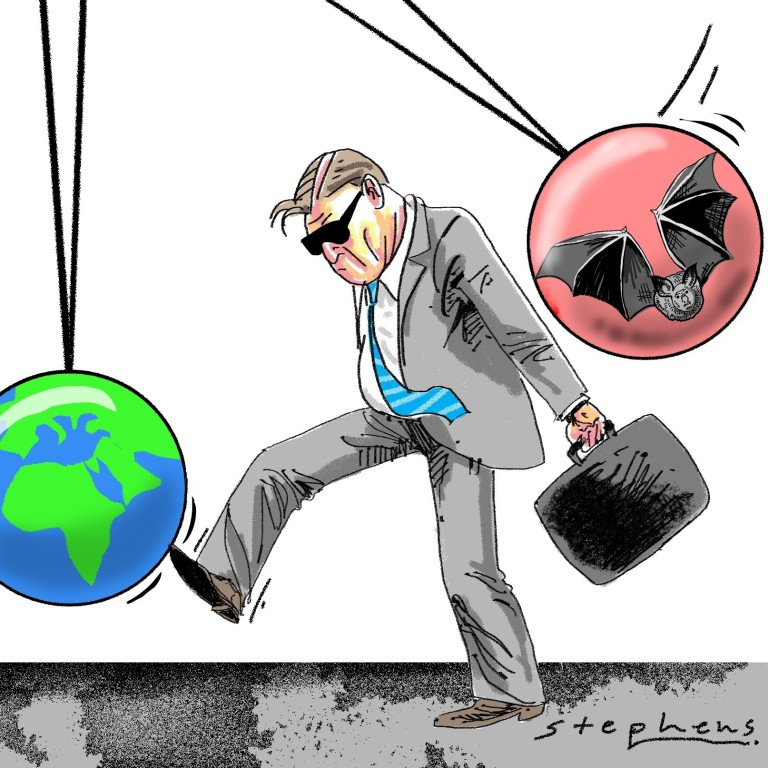
The coronavirus pandemic is nature’s wake-up call to humans who have lost their Way
- The prevention of future pandemics must be a collective effort by the world, but China has a crucial role to play
- The country must adopt a more environmentally sustainable development model, and it can start by relearning Taoist teachings
Taoism must be the greenest religion in the world. Dating from more than 1,800 years ago, China’s only indigenous religion emphasises harmony between mankind and nature. Its central concept is the Tao, which is usually translated as “the Way”, and also means “path” or “principle”. It advocates taking a holistic approach, respecting the natural order, and letting things take their natural course. The Way of Heaven is the way of nature; it is not purposive human activity but non-interference.
But this should have surprised no one. An expanding human population, industrialisation and urbanisation at breakneck speed have disturbed the ecology, and our continued erosion of wild space has brought humans uncomfortably close to animals. As a result, more zoonoses – diseases transmitted from animals to humans – have emerged around the world in the past two decades.
The breeding, trading and consumption of wild animals has made China susceptible to disease outbreaks. But the problem goes beyond China. Modern methods of agribusiness, such as factory farming, are also contributing to the growth of zoonoses.
Scientists have established a link between the emergence of highly pathogenic bird flu viruses and the intensification of poultry production systems. In his 2016 book Big Farms Make Big Flu, biologist Rob Wallace tracks the ways influenza and other pathogens emerge from an agriculture controlled by multinational corporations in developed countries. Chicken and other poultry are packed into mega-barns, grown out in a few months, slaughtered, processed and shipped all over the world. If a virus emerges, it can race through a flock packed together without any resistance. If it then spills over into humans, the consequences are dire.
All these problems at home and abroad are proof that nature has been interfered with, as humans go against the natural order. This is a good time to revisit the philosophical aspects of Taoism.
The Tao-te Ching says: “Man takes his law from the Earth; the Earth takes its law from Heaven; Heaven takes its law from the Tao. The law of the Tao is its being what it is.” In the eyes of Taoists, mankind and nature are bound together in an organic chain, and therefore in a relationship of reciprocity. If nature is in agreement with mankind, the world is harmonious and prosperous. If nature is mistreated by mankind, it can retaliate by causing calamitous suffering.
Some conservationists fear that traffickers might exploit these potential loopholes to continue trading wildfire. Still, the ban is a big step forward in the right direction.
The West doesn’t give China enough credit for its green leadership
For years, international conservation groups have criticised the way China regarded wild animals as commodities. Corruption has also made it that much harder to police the illegal trade of live wildlife. Biodiversity loss is severe in China, where 61 per cent of wild animals face extinction.
The prevention of future global pandemics must be a collective effort by people from around the world, but what China chooses to do is crucial to this battle. We will have to address the roots of the problem – the destruction of our environment – and shift our development model away from an overemphasis on economic benefits towards an environmentally sustainable model.
Sustainable development is a relatively new idea. Interestingly, Taoism, in its creed and practice, is compatible with sustainable development: notably, it is deeply concerned about harmony with nature, and nature’s ability to provide for mankind’s present and future needs.
Naturally, no religion or philosophy alone can resolve an environmental crisis or a pandemic. But if we are able to hermeneutically reconstruct Taoist teachings and reintegrate them into our culture, we may benefit greatly from ancient wisdom.
Take, for example, the issue of vegetarianism. Although the two main schools of Taoism hold different views on this, the religion generally encourages devotees to avoid meat and minimise harm, because animals are sentient beings. Just imagine how much good it would do the environment if 1.4 billion people could cut their meat intake by half!
Lijia Zhang is a rocket-factory worker turned social commentator, and the author of a novel, Lotus. Xia Chen is a research fellow at the Institute of Philosophy, Chinese Academy of Social Sciences, Beijing


